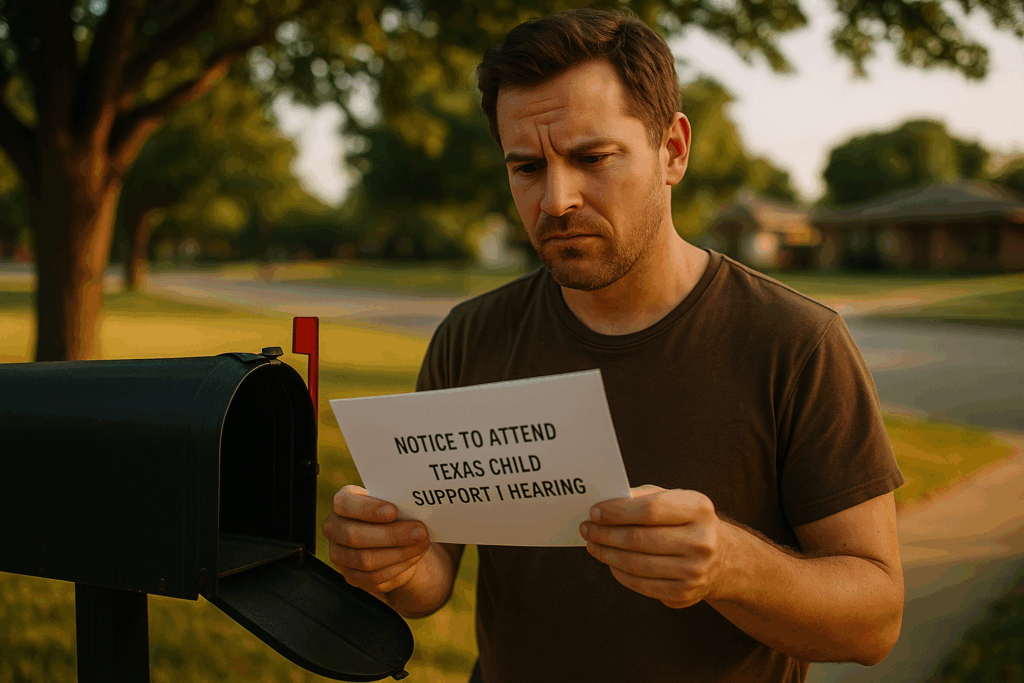
Picture this: you’re opening your mailbox on an ordinary afternoon, only to find an official-looking envelope that instantly makes your stomach drop — it’s a notice about Attending a Texas Child Support Hearing and suddenly your mind is spinning with a hundred questions. What does this mean? How should you prepare? What if things don’t go your way? If this feels overwhelming, don’t worry — you’re not alone, and you’re exactly where you need to be.
The short answer is this: Attending a Texas Child Support Hearing doesn’t have to be a nightmare. With the right preparation, a little legal know-how, and a supportive team behind you, you can walk into that hearing with confidence and leave knowing you’ve protected your child’s financial future. This article will guide you through the entire process — from what documents to bring, to how judges make decisions, to how child support ties directly into your child’s academic success.
At The Law Office of Bryan Fagan, PLLC, we know that knowledge is power. Families who understand the system are the ones who thrive, both inside and outside the courtroom. So if you’re ready to feel less stressed, more prepared, and confident about protecting your child’s future, keep reading — we’ve got you covered.
Key Takeaways
- Texas child support hearings determine financial support for a child, focusing on both parents’ contributions to ensure the child’s well-being.
- Proper preparation, including gathering required documents and timely arrival at the courthouse, is essential for a successful hearing outcome.
- Legal representation significantly influences child support cases, helping parents navigate complexities and advocate for favorable arrangements.
Understanding the Purpose of a Texas Child Support Hearing
Attending a Texas Child Support Hearing typically starts with a petition filed as part of a divorce, custody dispute, or separation. At its core, the hearing focuses on determining the appropriate financial support necessary to ensure a child’s well-being, with both parents sharing the responsibility fairly under Texas law. The court’s primary objective is to protect the child’s best interests by establishing, modifying, or enforcing a child support order in compliance with Texas Family Code § 154.001, which governs child support guidelines.
When setting the child support amount, judges carefully consider several key factors, including the financial stability of each parent, the specific needs of the child, and the child’s standard of living prior to the parents’ separation. The attorneys at our firm understand that this process is about much more than just numbers — it’s about maintaining strong parent-child relationships and providing stability during a critical time of transition.
For parents new to this process, learning what happens before the hearing can be just as important. Our article What to Expect at a Child Support Review Hearing provides valuable insight into the preliminary steps you may encounter before appearing in court. If you are facing challenges related to modifications, you may also find our guide on How to Modify a Child Support Order in Texas helpful.
At The Law Office of Bryan Fagan, PLLC, we are dedicated to offering practical legal guidance with a compassionate approach, ensuring families feel supported and empowered at every stage of the child support process.

Notification of Hearing Date
Court hearing notices in child support cases are usually sent by mail or served formally. Once a date is set, both parents receive details about the date, time, and location, ensuring they have enough time to prepare.
Receiving the notice allows parents to gather necessary documents, consult legal counsel, and plan for the hearing. Proper preparation can significantly impact the outcome, so it’s crucial to take the notification seriously.
Required Documents and Evidence
Parents must bring specific documents and evidence to the child support hearing, including recent pay stubs, tax returns for the past two years, and proof of any additional income sources like bonuses or side jobs to pay child support. These documents help verify income and assess financial stability, especially in cases of wage garnishment, including child support payments.
Documentation of childcare expenses and healthcare costs, including insurance premiums and medical support expenses, is also crucial. These records offer a comprehensive view of the child’s needs, aiding in support calculations.
Step-by-Step Guide to Attending the Hearing
When Attending a Texas Child Support Hearing, preparation and punctuality can make a world of difference. Arriving at least 30 minutes early ensures you have enough time to pass through security, locate your assigned courtroom, and check in with the appropriate clerk’s office to confirm your attendance. Being organized with all necessary documentation — including income verification, childcare expenses, and health insurance information — is critical to presenting your case effectively under Texas Family Code § 154.062, which outlines the calculation of net resources for determining child support obligations.
During the hearing, it is important to respond to the judge’s questions directly, honestly, and respectfully, using straightforward language. Avoid overly emotional statements and focus on providing clear, factual information. As our family law team often advises, maintaining composure can significantly influence the court’s impression of your credibility and commitment to your child’s best interests.
It’s also wise to prepare for the possibility of delays. Hearings can sometimes be extended or even continued to another date if additional evidence or testimony is needed. Multiple court appearances are not uncommon, particularly in contested cases involving enforcement or modifications. For parents who are also managing involvement with Child Protective Services, we recommend reading our article What Can Be Done If CPS Has Taken Possession of Your Child to understand how CPS proceedings can impact child support and custody hearings.
For more detailed guidance on how hearings fit into broader custody and support disputes, explore How to Modify a Child Custody Order in Texas. At every step, the attorneys at The Law Office of Bryan Fagan, PLLC are here to provide the practical advice and compassionate representation that Texas families can trust.

What Happens During the Hearing
When Attending a Texas Child Support Hearing, both parents are generally expected to participate unless there are exceptional circumstances, such as a party being a minor or credible allegations of family violence. During the hearing, each side presents their case through evidence, financial documents, and testimony. The ultimate goal is often to negotiate an agreed order that reflects the best interests of the child, as outlined under Texas Family Code § 154.122, which encourages agreements between parties consistent with statutory guidelines.
If the parents can reach an agreement, the proposed order is submitted to the judge for review and approval. This collaborative approach can save time, reduce stress, and allow families to move forward more quickly. However, if no agreement is achieved, an Assistant Attorney General representing the State of Texas will present the case based on available evidence, and the judge will render a decision using the statutory child support guidelines found in Texas Family Code § 154.125.
Throughout the process, it’s essential to be organized, prepared, and focused on the child’s needs. Our family law team encourages parents to review Best Tips for Preparing for Your Texas Child Support Hearing for practical strategies on navigating this important day. For those also dealing with related custody matters, you may find helpful insights in How to Prove Separate Property in a Texas Divorce, which discusses critical evidence considerations.
The attorneys at The Law Office of Bryan Fagan, PLLC are committed to standing with you throughout every step of your case, helping ensure that your child’s financial stability and overall well-being remain the top priority.

Communicating with Judges and Officials
Address the judge as ‘Your Honor’ and wait to be called before speaking. Maintain a respectful demeanor by avoiding signs of disrespect, such as rolling your eyes or sighing loudly. Never interrupt; wait for your turn to speak to show respect for the judicial process.
Managing emotions under pressure helps communicate effectively during the hearing. Avoid emotional outbursts and maintain a calm, composed attitude to convey seriousness. Negative language about the other party can harm your credibility, so focus on presenting your case positively through mediation.
Dressing appropriately creates a positive first impression during the hearing.
Disagreements and Objections
Parents may disagree with the proposed amount or recommendations during the child support hearing. Voicing disagreements effectively ensures their perspectives are considered.
Present clear and compelling reasons to provide guidance for your objections to help the judge sign and consider your viewpoint in their final decision.
Virtual Hearings: What to Expect
In today’s legal environment, Attending a Texas Child Support Hearing may not always mean going to a physical courthouse. Many Texas child support cases are now handled through virtual hearings, conducted entirely online via audio or video conferencing platforms. These remote proceedings are authorized under Texas Family Code § 102.0091, which supports electronic participation in hearings to promote efficiency and accessibility for families across the state.
Using high-quality audio and video equipment is critical when attending a virtual child support hearing. Clear communication helps ensure that your statements, evidence, and interactions with the court are fully understood and accurately captured. Specialized software often used during virtual hearings provides real-time transcription and electronic evidence sharing, making the process highly efficient while maintaining the same legal standards as in-person courtrooms.
As our family law team often advises, preparing for a virtual hearing requires the same level of diligence and professionalism as appearing in person. For additional information on how child support enforcement proceedings are managed — both in person and virtually — we encourage you to review Enforcement Cases and the Office of the Attorney General for deeper insight into how enforcement matters are handled under Texas law. You may also find our article What Happens in a Texas Custody Enforcement Hearing helpful if your case involves related custody concerns.
At The Law Office of Bryan Fagan, PLLC, we remain committed to making sure clients feel confident and supported, whether they are stepping into a courthouse or logging in from their living room. No matter how the hearing takes place, your child’s future deserves thoughtful, prepared advocacy.

Importance of Legal Representation
Having an experienced family law attorney by your side when Attending a Texas Child Support Hearing can make all the difference. Effective legal representation ensures that your rights are protected and that any child support obligations are calculated fairly in accordance with Texas Family Code § 154.062, which governs the determination of net resources for support purposes. An attorney can present your financial evidence clearly, challenge inaccurate claims, and advocate for arrangements that truly serve your child’s best interests.
Real-world examples consistently show that families who partner with skilled legal advocates often achieve better financial outcomes for their children. Whether it’s securing more reasonable support obligations, negotiating medical and dental support terms under Texas Family Code § 154.181, or ensuring that custody arrangements prioritize educational stability, the attorneys at our firm understand the complexities that shape each case. Strategic advocacy helps parents avoid costly mistakes and unnecessary courtroom setbacks.
Our family law team often encourages parents to prepare thoroughly for any family law hearing, whether the focus is child support, custody, or both. For additional guidance on appearing in court, we invite you to read Preparing for Your Child Custody Hearing in Texas for practical tips that apply to both custody and support proceedings. You may also find our insights on How to Modify a Child Custody Order in Texas helpful if your situation involves changing existing orders.
At The Law Office of Bryan Fagan, PLLC, we are committed to ensuring that families across Texas have the knowledge, preparation, and strong advocacy they need to protect their children’s futures with confidence.

Practical Tips for Confidence
Dressing appropriately reflects respect for the judicial process. Arriving early helps parents settle in and reduce anxiety. Visualizing the hearing process can alleviate nerves and enhance preparing. Staying organized and maintaining a respectful demeanor under pressure are crucial for a successful outcome.
Real-Life Examples and Client Stories
Families often face challenges during child custody battles, impacting their emotional and financial well-being. Real-life examples or client stories humanize the process and show how the Law Office of Bryan Fagan PLLC helps clients achieve significant changes in positive custody arrangements that can happen.
These stories highlight the positive outcomes achieved by clients with the help of the Law Office of Bryan Fagan PLLC, underscoring the importance of a supportive and knowledgeable legal team during child support hearings.
Common Concerns Addressed
Both parents are typically expected to attend child support hearings, as it is their responsibility. If one parent does not show up, the court may proceed without them or reschedule the hearing.
The Attorney General’s office of the attorney plays a vital role in the enforcement of child support orders. Understanding these common concerns can help parents feel more prepared and less anxious about the hearing process, especially with the assistance of a child support officer.
Conclusion:
At the end of the day, attending a Texas child support hearing isn’t just about paperwork, courtroom procedures, or financial calculations — it’s about showing up for your child’s future. With the right preparation, a clear understanding of the process, and a solid plan to support your child’s well-being, you’re already taking powerful steps toward building a stronger, more stable foundation for your family.
If you’re feeling unsure or overwhelmed, that’s perfectly normal — and it’s exactly why having an experienced Texas Family Law Attorney by your side matters so much. At The Law Office of Bryan Fagan, PLLC, we’re here to guide you through every hearing, negotiation, and decision with a steady hand and a clear focus on protecting what matters most.
Every family’s story is different, but every parent facing a child support hearing shares a common hope: to make the best possible future for their kids. If you’re ready to take the next step, we’re ready to walk it with you. And hey — years from now, when you see your child thriving in school, chasing their dreams, and knowing they were supported every step of the way, you might just be grateful you took a deep breath and faced this process head-on. We’ll be right here whenever you need us.
Texas Child Support Hearing FAQs
What to expect at a child support review hearing in Texas?
At a child support review hearing in Texas, you can expect to meet with a child support officer instead of going before a judge. Both parents will provide financial information, and the officer will propose a child support order. If both parties agree, the order is signed without a court hearing; if they disagree, the case may move to court.
What not to say at a child support hearing?
At a child support hearing, you should avoid making emotional outbursts, speaking negatively about the other parent, admitting to financial dishonesty, or showing disrespect toward the judge. Stick to facts, stay calm, and answer questions honestly and respectfully.
What happens in child support court in Texas?
In child support court in Texas, the judge reviews the financial situation of both parents to determine a fair support amount. Evidence such as income statements, expenses, and insurance coverage is considered. The court will then issue an enforceable child support order based on the child’s best interest.
How do I attend a Texas child support teleconference?
To attend a Texas child support teleconference, you will typically receive instructions by mail or email with the call-in number or video link. Make sure to test your technology beforehand, find a quiet location, and have all necessary documents ready to present during the teleconference.
What questions are asked in a child support hearing in Texas?
Common questions asked during a Texas child support hearing include inquiries about your current employment, income sources, childcare expenses, healthcare coverage for the child, and whether you have other dependents. The court wants to understand your financial situation accurately.
What will the judge ask in a child support hearing?
The judge may ask about your employment status, your earnings, any additional income, child-related expenses, and existing custody or visitation arrangements. The goal is to gather complete information to determine a fair support amount that serves the child’s best interests.
What looks bad in a custody battle?
In a custody battle, behaviors such as speaking badly about the other parent, failing to prioritize the child’s needs, violating court orders, showing poor judgment, or demonstrating instability can look very bad and hurt your case significantly.
What not to say at a hearing?
You should avoid exaggerations, insults, emotional rants, and any statements that show unwillingness to co-parent. Always focus on facts and on what benefits the child rather than airing grievances against the other parent.
How is the best interest of a child determined?
Texas courts determine the best interest of a child by looking at factors such as emotional and physical needs, the stability of each parent’s home, the ability of each parent to meet the child’s needs, any history of abuse or neglect, and the child’s relationship with each parent.




